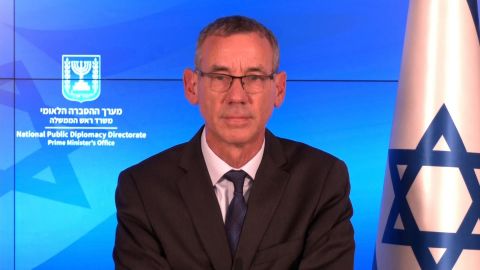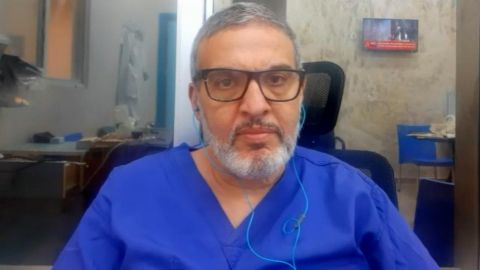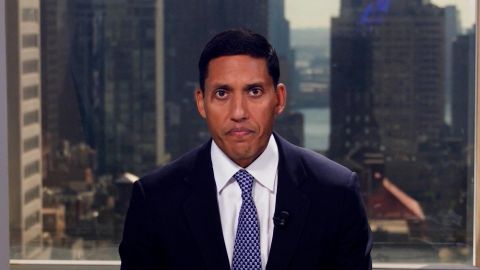Read Transcript EXPAND
DR. GHASSAN ABU-SITTAH, BRITISH-PALESTINIAN SURGEON: The problem is the sheer size of the calamity that has befallen Gaza. 6,500 wounded in six days in a place where the total bed capacity is 2,500. This has completely overwhelmed the health system, which was already on its knees at the end of 15 years of siege. And the health system is unable to cope. We are down on consumables, on the very material that you need to be able to treat patients, whether they’re dressings or anaesthetic equipment or disposable. And the capacity, the operating room capacity of most hospitals in Gaza is unable to cope with the sheer number of patients who need to be taken to the operating rooms and the patients who now are critically ill and need intensive care unit.
AMANPOUR: Dr. Ghassan, can you tell me what is the effect, and are you feeling it yet, of the blockade as the Israeli defense minister announced a few days ago, as I was just talking to a senior government adviser about, you know, the fuel, the water. Do you have enough water? Do people have food? Is it going to run out?
DR. ABU-SITTAH: So, the thing that you notice most when you’re in the hospital is the absence of basic medical aids, equipment that you need to be able to treat the patient. Also, all of the hospitals now are completely dependent on generators for electricity. And diesel is one of those things that are now not coming in as a result of this total blockade. You see these water tanks that are being delivered to homes and to hospitals all around the clock, even though there is continuous bombing. Food at the moment is not short, but there are over 250,000 people displaced. A lot of them, thousands, living in the compound of Al-Shifa Hospital, the — Gaza’s main hospital or with relative. And so, these people who have lost their homes have lost their ability to fend for themselves and feed themselves. And so, what we’re looking at is catastrophe, a man-made catastrophe that’s almost like a perfect storm. People are displaced. Their homes are destroyed. A crippled health system as a result of the siege. And numbers beyond the capacity of the health system to deal with it.
AMANPOUR: Dr. Ghassan, can I ask you something? you came in somehow into Gaza from the U.K., I’m assuming from the Egyptian side, the Rafah Border. And, you know, you know Israel has told people to leave, just leave, seek shelter, leave. Is there two-way traffic? Are people able to leave? You were able to come in.
DR. ABU-SITTAH: So, I was part of the last group of people that kind of got in on Monday morning, early hours of Monday morning, and I think soon after the Israeli Air Force bombed the area around Rafah and forced it shut. There hasn’t been anybody in and certainly no one has been out since then. I think the Rafah Crossing has been shut since then.
AMANPOUR: And tell me what motivated you to go there? And have you done this before in other war zones?
DR. ABU-SITTAH: So, I’ve been to Gaza’s wars in the 2009 attack on Gaza, 2012 and ’14 and 2021. And I’ve worked in Mosul, I’ve worked in Yemen, I’ve worked in Damascus. I am a plastic and reconstructive surgeon. I have, over the years, developed an expertise in war surgery. And as a Palestinian, I am driven to, you know, continuously come back and help my people here who are under continuous attack. And as someone who’s worked in the health system in Gaza, I’m acutely aware of the shortfall in terms of equipment and expertise and material that exists in the system.
AMANPOUR: And can you tell me what kind of injuries you’re seeing most of is it? I know you’ve talked about burns and not even having the right disinfectant to rub down burns before treatment. But what other injuries are you treating?
DR. ABU-SITTAH: So, when the overwhelming majority of the wounded are coming from the rubble of their own home, and this means that between 30 and 40 percent of the wounded are children, and they’re injured by the blast, shrapnel, masonry that flies in and damages their bodies or they’re crushed under the rubble of their own home. So, all of these injuries are extremely contaminated and require surgeries and repeated surgeries. And the devastating thing is with children. This is a lifetime worth of reconstructive surgery as that body, that scarred body tries to grow in the future, these kids will need surgery after surgery,
About This Episode EXPAND
Benjamin Netanyahu’s senior adviser Mark Regev discusses the Israel-Hamas War. British-Palestinian surgeon Ghassan Abu Sittah left London for Gaza on Sunday and joins the show. Israeli author and historian Yuval Noah Harari discusses the origins of the conflict in this region. Dr. Rajiv Shah, author of the new book “Big Bets,” on how decision makers can learn from conflict and implement change.
LEARN MORE


